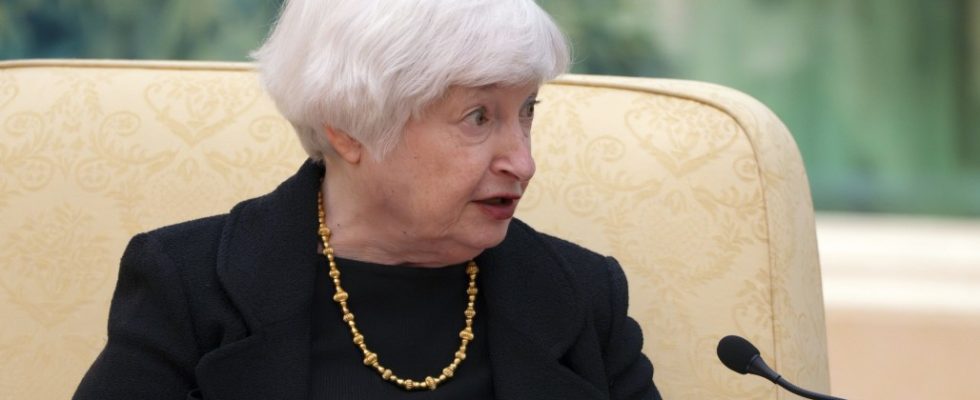During her visit to Beijing on Friday, US Treasury Secretary Janet Yellen defended US export restrictions to China and criticized the actions of Chinese security authorities against some US companies in recent months. At the same time, she demonstrated a willingness to cooperate and declared that a better relationship between the US and China was needed.
Speaking to China’s Prime Minister Li Qiang, Yellen emphasized that the United States is not aiming for an economic power struggle: “We are striving for healthy economic competition in which the winner does not take everything.” Competition with fair rules could “benefit both countries in the long term,” she told Li at the Great Hall of the People in Beijing. Yellen’s four-day visit is seen by both sides as an attempt to calm conflict-ridden relations between China and the United States at a time of rising tensions.
Yellen’s visit is a balancing act
The Chinese side also hopes that Yellen, who is seen as pragmatic in China, will come to terms with the visit on economic issues. Yellen is “a voice of moderation” in the Biden government, wrote the Beijing propaganda paper Global Times just before Yellen’s arrival. Perhaps her trip could “keep the channels of communication open at high levels” and thus “help bilateral relations emerge from their downward spiral”.
Yellen already rejected a decoupling of the two economies, as the more radical parts of the Republican camp are now demanding in Washington, after her arrival on Friday: Firstly, such a decoupling is not feasible and secondly it is destabilizing for the global economy.
However, the visit is a balancing act for Janet Yellen. Just last October, US President Joe Biden signed new rules designed to cut off China’s access to high-performance chips used in the latest computers and military technology. Also under pressure from Washington, the government of the Netherlands introduced export restrictions on the sale of machines capable of producing the most advanced semiconductors last Friday. The Dutch concern ASML is a world leader in the production of such machines. This was announced shortly before Yellen’s trip to Beijing Wall Street JournalWashington is now also planning to restrict Chinese companies’ access to cloud storage services from American providers.
For its part, Beijing earlier this week announced export restrictions on the export of gallium and germanium, two rare commodities used in semiconductor manufacturing. “This is just the beginning of China’s countermeasures,” former Vice Minister of Commerce Wei Jianguo told the newspaper China Daily.
China is skeptical across camps in Washington
“Under certain circumstances, the United States will have to take targeted measures to protect its national security,” Yellen tried to explain the US position on Friday. “And we can have different opinions on these cases.” In the past, Yellen has not only regularly opposed a possible decoupling. She also repeatedly criticized the punitive tariffs on Chinese products introduced by then US President Donald Trump. “Tariffs are taxes for consumers,” she said in 2021.
However, a reduction in these punitive tariffs does not appear to be in sight for the time being. The US presidential election campaign is about to begin. And in Washington there is a cross-camp skepticism about China, which often turns into hysteria in parts of the right wing of the Republican Party. Republican Mike Gallagher, who heads the House of Representatives’ special committee on the Chinese Communist Party, accused the Biden government of engaging in “zombie engagement” with the Communist Party in Beijing. Yellen’s visit to Beijing has been viewed critically by many in Washington.
Right at the beginning of her visit, the Minister of Finance was not sparing with critical tones. At a meeting with US business leaders in Beijing on Friday, Yellen bemoaned China’s unfair market practices and said she was “particularly concerned by the punitive measures taken against US firms in recent months.” In March and April, Chinese security authorities stormed the offices of American consulting firms in Shanghai and Beijing and interrogated or even arrested the employees. The companies had specialized in so-called “due diligence” processes, i.e. examining possible risks for foreign investors and companies.

